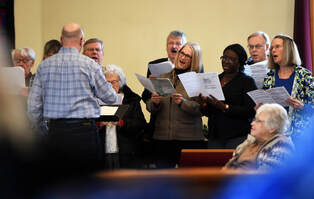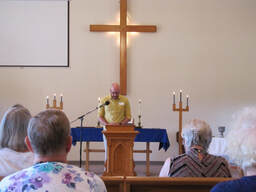 Earlier this week the focus of Christian Twitter's outrage shifted away from Beth Moore (at least for a few days) to a small church outside the Twin Cities. The St. Paul Pioneer Press ran an article with the headline "Cottage Grove church to usher out gray-haired members in effort to attract more young parishioners." In case you missed all the hoopla, in essence a declining church announced it would shut down and re-launch with an emphasis on new music and a younger pastor. Many who were at the meeting when it was announced felt it was an attempt to push out the older members, and they pointed to a memo as part of the relaunch plan. Sarah Bailey with the Washington Post offers some additional help in seeing the intent of both the main campus and the regional conference to try to establish a vibrant and thriving church in the area. Whatever is going on in Cottage Grove, there are two realities that we have to acknowledge: 1. Failing to change is a path to death for any church 2. Every church has a life cycle, and none are guaranteed forever The situation at Cottage Grove is one not unfamiliar to many churches around the country, regardless of denomination. It's easy to pick on the UMC as a test case of the decline of mainline denominations, but even in our very conservative SBC tribe, churches are facing the same issues Cottage Grove is. The finances are a wreck, attendance is dwindling, and they sit in a facility they can no longer use, afford to maintain, or downsize.  One of the things the article exposed in the big picture is the perception that churches practice, directly or indirectly, an exclusion of older members in the name of change. The stereotype is that older attenders are in the way of change, and rather than work with them the answer is to work around them. Can I say there's a theological term for that? Idiotic. It's idiotic because the church is a Body. Paul's language of the church in 1 Corinthians is that it's a Body with many parts. Not everyone is an eye, nor is everyone a foot. Implied in that is that we aren't all alike in the church. We're made of a wonderful cross-section or tapestry of the community around us. Normally our communities aren't monolithic. They're made of old and young, middle class and struggling, white and minority, blue collar and professional. In some cases and in some communities, the makeup of the church will be more homogenous, but it ought not be exclusively homogenous. Churches on a college campus will likely be mostly 20 somethings, but that church also needs gray hair. Churches in retirement areas will likely be mostly over 70, but that church needs young families as well. It's idiotic because the church is a Family. Our family gatherings are the bringing together of 3-4 generations. Our parents can still remember separate water fountains, the moon landing, and the fascination with the microwave. Their parents can remember ration stamps and the Depression. Our kids have never known a time without Netflix. And then there's us Xennials who grew up with payphones and now have everything about our lives in our pocket. Families are like that. Families are spread out. And they come together under one common thing, the table. The church does the same, but the table is the Lord's Supper. When we take the Lord's Supper we're participating in a family gathering, where everyone comes together. It's a beautiful picture. It's idiotic because the church is an Outpost. We're citizens of another Kingdom, strangers and aliens in this one. It's not our home, we're residents of this world but our passports are from heaven. So the church is the outpost, or embassy, of our home Kingdom. When we exclude or push away people who don't "fit" what we're aiming for, we're telling them they're not welcome on their home soil. None of us would want to be turned away at the US Embassy if we were visiting another country. It's the same with the church. We are the outpost of safe refuge, where we can gather with one another for encouragement, fellowship, fuel, and to be sent back out on mission. At times we are wise and effective to target specific points of outreach or programmatic ministry. I love that churches have senior adult ministries and ways to reach out to those who are in that group. I love churches with student ministries to reach into communities and places that senior adults can't be (Ms. Ethel can't be in your algebra class). I even love churches that have a special night dedicated to engage college students and young adults. But those aren't in place of the gathered church in worship. Our aim as pastors must be to lead our churches forward, together. How have you seen your church move forward together? *Hat tip to 9Marks and Jonathan Leeman's book Church Membership for the Body, Family, Embassy imagery
0 Comments
Leave a Reply. |
Scott M. DouglasA blog about leadership and the lasting legacy of family ministry. Archives
August 2023
Categories
All
|
 RSS Feed
RSS Feed



